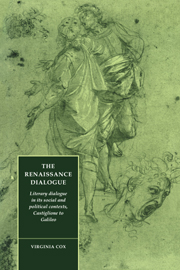 The Renaissance Dialogue
The Renaissance Dialogue Book contents
- Frontmatter
- Contents
- Preface
- 1 Problems of method
- 2 History and invention in the dialogue
- 3 The uses of the dialogue in sixteenth-century Italy: celebration and control
- 4 The uses of the dialogue in sixteenth-century Italy: commerce and courtesy
- 5 Castiglione's Cortegiano: the dialogue as a drama of doubt
- 6 The changing form of the Italian Renaissance dialogue
- 7 The theory and practice of the dialogue in Counter-Reformation Italy
- 8 From the ‘girevole strada’ to the straight and narrow path
- 9 From the open dialogue to the closed book
- Notes
- Bibliography
- Index
3 - The uses of the dialogue in sixteenth-century Italy: celebration and control
Published online by Cambridge University Press: 05 December 2011
- Frontmatter
- Contents
- Preface
- 1 Problems of method
- 2 History and invention in the dialogue
- 3 The uses of the dialogue in sixteenth-century Italy: celebration and control
- 4 The uses of the dialogue in sixteenth-century Italy: commerce and courtesy
- 5 Castiglione's Cortegiano: the dialogue as a drama of doubt
- 6 The changing form of the Italian Renaissance dialogue
- 7 The theory and practice of the dialogue in Counter-Reformation Italy
- 8 From the ‘girevole strada’ to the straight and narrow path
- 9 From the open dialogue to the closed book
- Notes
- Bibliography
- Index
Summary
Et vengo fra me medesimo considerando che i piaceri della musica, delle feste, delle giostre, delle comedie e tutti gli altri giuochi, e spettacoli siano nulla, rispetto alla gioia che si sente nella conversazione de' gentili spiriti
Stefano Guazzo, La civil conversazione (1574)Questa non è passe da venire a disputare della luna, né da volere, nel secolo che corre, sostenere né portarci dottrine nuove
Piero Guicciardini (1615)The discrepancy between the norms of dialogue practice in Italy and elsewhere, in the sixteenth century, is so striking that it seems quite unaccountable that it has never been remarked upon. It is only, in fact, in Italy, that the use of identifiable historical figures as the interlocutors in dialogues was anything other than an exceptional occurrence. In France, in Spain, in Germany, in England, even in dialogues on the most serious of subjects, the Lucianic convention of using fictional interlocutors prevailed almost unchallenged. What, in Italy, was a styleme of a circumscribed comic mode was, in the rest of Europe, an unmarked element in the grammar of the literary dialogue.
Examples can be found, of course, of dialogues written outside Italy which conform, more or less, to ‘documentary’, neo-Ciceronian models. Guy de Brués's Dialogues contre les nouveaux Academiciens (1557) represent a conversation between the poets Baïf and Ronsard and the lawyers Guillaume Aubert and Jean Nicot, in which not only the use of named contemporary figures, but also the setting, the structure and the overall tone of the discussion testify to a sustained imitation of Platonic and Ciceronian models.
- Type
- Chapter
- Information
- The Renaissance DialogueLiterary Dialogue in its Social and Political Contexts, Castiglione to Galileo, pp. 22 - 33Publisher: Cambridge University PressPrint publication year: 1992


